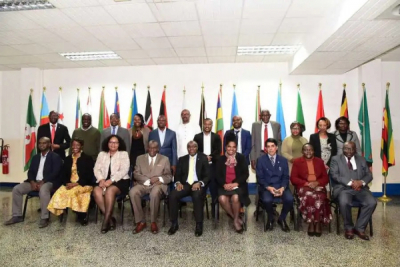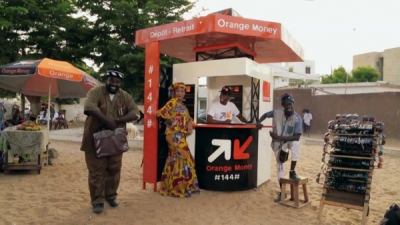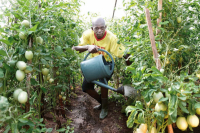The tech sector is booming in most African countries. To improve its impact on the continent, two countries have decided to join forces and conquer other markets.
Rwandan technology park kLab and Gabon Digital Incubation Company (SING S.A) plan to develop an exchange program. For that purpose, last Wednesday (July 13), kLab’s general manager Yeetah Kamikazi (photo, right) and Yannick Ebibie Nze (photo, left), CEO of SING S.A, signed a partnership agreement. The exchange program aims to support the two countries’ startup ecosystem and financing sources to quickly achieve conclusive results.
Under the terms of the agreement, SING S.A. (which has already incubated 53 startups, including eight with tremendous growth) will facilitate the exchange program development.
“We can build on the results achieved by kLab as a non-profit organization in Rwanda over the past few years. In Gabon, we have a different model [Ed. note: SING S.A is a for-profit organization] and I believe it will be great for kLab to also find ways to secure additional financing outside traditional sources like the government and international partners,” explained Yannick Ebibie Nze.
For Yeetah Kamikazi, the Gabonese market is a prospective market for Rwandan startups, given the small size of her local market. She also added that Gabon needs Rwanda’s expertise in the e-transport and e-governance sectors.
In Rwanda, the government is committed to making the country an African IT hub. Also, for years now, Kigali has been the host of the tech hubs of major international firms. In December 2021, coworking space and investment fund Norrsken Foundation launched an entrepreneurship hub in Kigali, to welcome 1,000 entrepreneurs by the end of 2022. To date, the country’s startups have raised US$23 million, including US$17 million in 2021.
Adoni Conrad Quenum
Its prototype was a low-cost solution developed to test the viability of the founder’s idea. Once corrected and refined, the solution is now accessible in five countries, helping thousands of users.
Lisungui Pharma is a digital platform developed by a Congolese startup founded in 2015. The health tech platform geolocalizes pharmacies located within a 10-kilometer radius from the user. It also helps determine drug availability and prices and acts as a medication reminder.
To develop the prototype of the digital platform, the Congolese startup contracted Indian developers, to check whether the idea could be embodied in an app, indicated its founder, Rufin Ovoula Lepembe.
“Due to its low-cost design, the prototype had several bugs but, it proved that the concept was valid and needed just refinements,” he added.
The platform is operational in Burkina Faso, Côte d’Ivoire, Senegal, Cameroon, and Congo. It is accessible only via an Android app. To use its features, users must register an account and enable geolocation.
Apart from showing the pharmacies accessible in the neighborhood, the platform also gives directions from the users’ location to the selected drugstore. In 2016, it earned its founder the first prize in the business competition organized by the Congolese foundation Perspectives d'Avenir. Two years later, the founder became one of the winners of the Tony Elumelu Foundation program. Rufin Ovoula Lepembe hopes his solution will be available in at least 20 countries in the coming years.
Adoni Conrad Quenum
Africa has the lowest internet penetration rate with just 22% of its population currently connected. To remedy the situation, countries are implementing various projects.
The African Development Bank (AfDB) and the common Eastern and Southern market COMESA signed an agreement letter last Wednesday (July 13). According to a release published by COMESA, the agreement letter concerns a US$550,000 grant to be provided by AfDB to fund the feasibility studies of COMESA’s Africa Cloud Ecosystem (ACE) project.
According to the release, the AfDB grant will “support the first phase; Market Analysis (Pre-investment study) which will assess the market for the ACE project and examine the bankability of the project including testing of the concept in the COMESA region.”
For AfDB Zambia country manager, Dr. Raubil Durowoju, “the Africa Cloud Ecosystem project will be a first of its kind, laying the foundation to facilitate the African continent to undertake this shift in the key sectors of the economy: education, government, agriculture, and health through the provision of a reliable ecosystem of datacentres.”
It aims to contribute to the installation of a state-of-the-art facility that will provide essential and sustainable ICT infrastructure services to the 21 COMESA member states and the African continent as a whole.
It is also expected to facilitate regional integration by taking full advantage of technology and laying the foundation for a duty-free and quota-free zone “which goes beyond the data-only aspects.” Its development should also “increase the sustainability and viability of information and provide a pivotal way of transitioning Africa’s community into a digital economic community.”
“Besides significantly lowering the cost for hosting services, identified as the main reason African businesses host their services overseas, the project will also remove barriers faced by African enterprises by promoting intra-regional trade and boosting innovation,” COMESA explains.
Once launched, ACE will improve Africa’s positioning in the global ICT landscape.
For COMESA secretary-general Chileshe Kapwepwe, once completed, the project will “enhance competitiveness by fostering regional connectivity and deepening continental integration.”
Samira Njoya
Following the death of his mother back at home, he decided to create a virtual health insurance platform. He aims to help the African diaspora guarantee healthcare for their relatives and avoid his painful experience.
Bertrand Nkengne (photo) is a Cameroonian software engineer and the founder of health-tech Izikare. The startup, founded in 2018, allows the African diaspora to easily buy health insurance policies for their relatives living on the continent. With his health-tech startup, insurance policies cost as low as €0.50 daily thanks to his network of over 300 professionals, 500 health centers, 300 laboratories, and pharmacies in Africa.
“Izikare provides a virtual and physical insurance card to your relatives living in Africa. [Thanks to that card], they can get healthcare, without paying a dime, from our partner network of health professionals, in hospitals, laboratories, clinics, pharmacies, and opticians,” he told Forbes in 2021.
Bertrand founded Izikare after a painful experience. Indeed, while he was in France, his mother got sick. To facilitate her treatment, he used to regularly send funds but, instead of being used for the sick mother’s treatment, most of the funds were used for other purposes. In the end, the software engineer lost his mother.
During the coronavirus pandemic, Izikare developed a free platform, AlloDocta, to facilitate virtual consultations, and the issuance of digital health records. The platform also integrates a secure drug prescription system.
Before Izikare, Bertrand Nkengne had founded, in 2006, Cyslog, a software development firm in France.
Melchior Koba
With over 10 years of professional experience in the tech industry abroad, he returned to his native country, Madagascar, with numerous project ideas. Barely five years later, the two digital firms he created are already thriving.
Ranto Andriambololona (photo) is a Malagasy entrepreneur and founder of the tech firm SmartPredict. Through the startup founded in 2018, he helps firms deploy artificial intelligence projects without any tech skills. He also developed RetailForecastor, a platform allowing commercial companies to predict and optimize their sales, therefore avoiding over and under-production.
In 2020, after a funding round supported by Investisseurs & Partenaires Accélération Technologies, Ranto informed that his ambition was to make SmartPredict an African unicorn and a flagship of the African tech ecosystem.
With his team, the young entrepreneur plans a series A funding round by the end of 2022. Apart from SmartPredict, he also founded the software development firm HaiRun Technology, which specializes in the development of personalized web and mobile apps for startups and companies. By 2021, the software development company founded in 2018 was already employing over 120 people. According to its founder, it aims to create a local entity employing 300 to 500 employees and federating competent skills around digital issues.
His entrepreneurship career is greatly facilitated by the digital skills he developed, since 2002, working with international firms, including Rakuten in France. In 2003, he joined Boursorama Banque as a production engineer. Then, in 2005, he was hired by software developer Sysload Software before he was appointed Axway’s product manager in 2015.
Melchior Koba
In Africa, mobile money has become the most popular alternative to bank accounts. In that promising ecosystem, the competition is ever high, supported by development partners willing to boost financial inclusion.
The International Finance Corporation (IFC) announced, Wednesday (July 13), a partnership agreement with Orange Bank Africa (OBA) to support digital finance services. Notably, the agreement will improve access to finance for agents and merchants operating in the West African mobile money ecosystem.
"Through the partnership with IFC, our bank aims to strengthen its collaboration with the thousands of agents and merchants, in particular in rural areas, who play a key role in the mobile money ecosystem. More generally, this project is in line with our mission to improve access to financial services in the region by leveraging transformations in the digital sector,” said Jean-Louis Menann-Kouamé, CEO of Orange Bank Africa.
The two partners will carry out a pilot phase in Côte d’Ivoire by providing liquidity to Orange Money agents to help them meet their clients’ needs. Indeed, agents, who are mostly underbanked, usually face liquidity constraints and are sometimes forced to reject transactions. As a result, they hinder both their growth and financial inclusion.
In addition to providing access to financing for Orange Money agents, “IFC will provide advisory services to Orange Bank Africa to help the mobile bank develop and test innovative and scalable digital lending products that meet the specific needs of mobile money agents as well as merchants accepting this type of payment.”
The partnership signed by the IFC and Orange comes a few days after Wave, one of Orange's competitors, secured a €90 million financing package arranged by the IFC. At the time, the IFC explained that the financial support “will help establish a mobile money environment where customers can transact more often thanks to a simple fee structure and lower transaction costs.”
Samira Njoya
The tech solution networks farmers, agronomists, and buyers to allow access to agricultural advisory and improve producers’ income.
Wagui is a digital app developed by a Gabonese eponymous startup, founded in 2018, by Marlyse Mapaga and Tamarah Moutotekema Boussamba. It offers useful recommendations to help farmers improve their production and income.
“By creating Wagui, I wanted to address the networking problems faced by farmers and producers but also improve their revenues. My aim was also to facilitate access to the agricultural advisory. Wagui can be improved thanks to users’ feedback. Our challenge is to include everyone into the value chains,” indicates Tamarah Moutotekema Boussamba.
Wagui networks farmers, buyers, and agronomists. It was born from the experience of one of its team’s relative who was able to pinpoint the problems faced in the agricultural sector. Currently, it is accessible via an Android app only.
In 2018, Wagui received the second prize for the best technology solution at the Africa Code Hackathon competition held in Egypt. The following year, it joined the Gabon Digital Incubation Company, a public company whose ambition is to boost “African companies’ competitiveness through digital transformation.”
Adoni Conrad Quenum
Amid the accelerating digital transformation, most African countries are introducing electronic visa reforms. For authorities, electronic visa reforms can improve the administrative and financial management of travel documents.
Cameroon will launch the issuance of e-visas at its diplomatic missions, consular posts, international airports, and air, land, and sea borders by the end of July 2022. For that purpose, the country contracted research and development firm Impact Palmarès R&D SAS for a 10-year agreement to modernize, secure, and streamline consular services.
According to the Ministry of Foreign Affairs, the e-Visa project aims to centralize and secure the data as well as control movement to and from the national territory. “It will also reduce the distance to be covered by applicants to request for visa and the queues in embassies. Those issues are the main problems reported by the diaspora and foreigners who want to visit Cameroon,” indicated Minister of Foreign Affairs Lejeune Mbella Mbella. The government official also revealed that the e-visa platform will help secure government revenues since fee payments are made online.
On Monday, June 27, 2022, Impact Palmarès R&D SAS delivered the IT equipment to be used for the project at the various diplomatic posts and embassies. Barely a week later, Cameroon submitted a draft project amending the January 1997 law on entry, residence, and exit conditions to the national assembly. In the coming days, a legal framework is expected to include e-visas.
“... To date, all the IT tools have already been developed. The equipment required has been delivered to Cameroon and [...] soon be deployed at diplomatic posts. The deployment has already begun at airports and it will be completed soon. Impact Palmarès is now ready to launch e-visa enrolment and issuance,” explains Ntaribo Ashu, Director General For Protocol And Consular Affairs at Cameroon’s Ministry of Foreign Affairs.
Samira Njoya
African countries are taking measures to avoid being left out in the current wave of digital transformation. Apart from internet connectivity, they are also addressing employability for socioeconomic growth.
To attract more investors, Mauritius intends to improve employability in its IT sector. In doing so, the country aims to have 2,000 additional jobs created in its IT sector in the next two years. The figure was presented by its Prime Minister, Pravind Jugnauth (photo), last Thursday (July 7), during the official ceremony organized by Accenture Mauritius to celebrate its 20-year presence in the country.
“We are currently working to attract other tech giants to Mauritius. Based on the pipeline of projects facilitated by the Economic Development Board, in the next two years, 2,000 new jobs will hopefully be created in the IT sector. They include notably programming, claims processing, customer support, cybersecurity, and data analysis,” the government official said.
To improve employability in the IT sector, Mauritius plans to accelerate skills development by creating a Digital Industry Academy supported by Landscope Mauritius. A cohort of 1,000 people is scheduled to start artificial intelligence, cybersecurity, and cloud computing training this month.
According to Pravind Jugnauth, with a 6.5% growth, the country’s IT sector is the only one that has not been affected by the global health crisis. In the sector, 30,000 people are already working for 900 firms, while 3,000 new jobs were created between 2020 and 2021, he added.
Samira Njoya
Thanks to information and communication technologies, African countries can efficiently manage their civil registration system, therefore improving population data and statistics.
The Nigeria Digital Identification for Development Project (ID4D) will cooperate with the National Population Commission (NPC) to digitize the civil registration system. The information was disclosed by ID4D coordinator Musa Odole Solomon, during a friendly visit to NPCs executive chairman, Alhaji Isa Kwarra, last Thursday (July 7).
At the end of the visit, Musa Odole Solomon expressed the ID4D project’s determination “to invest in the Civil Registry system to reinforce the foundational ID ecosystem by delivering National Identity Numbers at birth, as part of the birth registration process through links with the digitized Civil Register.”
According to the coordinator, “the project is designed, following an Ecosystem model and not limited to any single organization. It, therefore, involves different agencies of government, the private sector, and civil society. The project had since identified the National Population Commission as an important ecosystem partner.”
In 2020, the ID4D project secured US$430 million from the World Bank, the European Investment Bank, and the French Development Agency. It aims to develop an efficient identification system that will enable access to essential services. Its ambition is to increase the number of biometric ID cards issued from 40 million to 148 million by 2024.
According to Alhaji Isa Kwarra, the cooperation between ID4D and NPC will be useful in several areas. “We are trying to modernize our civil registration systems. We register births and deaths. We are supposed to be registering marriages and divorces, etc. Modernizing and digitizing our processes is very important and that is where you come in. We are willing to partner with you 100 percent. We are also involved in national identity coverage. I assure you of our total support and collaboration,” he said.
Samira Njoya
More...
Mobile money and digital payment solutions are gradually taking over the business world. To facilitate payment processing, entrepreneurs are developing efficient solutions.
Paymee is a fintech solution developed by a Tunisian eponymous startup. It is a gateway allowing firms to collect card payments.
According to Paymee founder Mawen Amamou (photo), the startup is already known for the simplicity and efficiency of its payment solutions. It now wants “to become the market reference in Tunisia … addressing [..] client needs and simplifying their operations …,” he said in a recent release announcing the completion of a “six-figure round.”
To integrate Paymee’s solution on their websites, firms just have to create a business account with the fintech startup and validate that account by submitting required documents. They can also use the startup’s application programming interface or plugins. No matter the integration method chosen, they can process their transactions in real-time.
In May 2019, the Tunisian Ministry of the digital economy labeled Paymee, which was founded in 2017, as a “startup”. Currently, it claims over 15,000 agent accounts and more than 250 business accounts with some 100,000 transactions processed.
Adoni Conrad Quenum
Over the past nine years, she has been a tireless advocate for gender equality in technology and the digital world. Her leadership position in the Senegalese public sector is also helping her reach her goals.
Bitilokho Ndiaye (photo) is a Senegalese sociologist. She is, since 2020, the Director of Promotion of the Digital Economy and Partnership at the Senegalese Ministry of Digital Economy. Before her appointment to that post, she already had years of experience in the local IT ecosystem, in the gender dimension notably.
Between 2009 and 2020, she was the gender technical advisor for the Ministry of Communication. For the sociologist, women should have a strong presence in the local digital sector for enhanced economic growth in Senegal.
"Women represent 51% of the population in Senegal. They will have a positive economic impact if they are taught how to use the internet as a tool. [...] Particularly, for the large majority of craftswomen and those who create value in remote areas, digital technology would be an effective way to reach more buyers and increase sales, therefore impacting the national economy,” she told Inspire Afrika.
Between 2007 and 2009, she was the communication manager of the Ministry of Information and Institutional Relations. She is also overseeing, since 2013, a project (“Gender and Technology”) that aims to “integrate the gender dimension into IT programs and boost women’s presence in leadership positions.”
In 2016, she founded the Association of Senegalese Women in the ICT/Digital Sector (FESTIC), which aims to accelerate digital transformation in Senegal by capitalizing on the female population. In 2018, as the president of FESTIC, she launched “maison des femmes entrepreneures,” a training center equipping women entrepreneurs with digital skills.
Melchior Koba
The e-visa platform aims to facilitate visa application processes, rendering the country attractive.
Togo announced, Monday (July 11), that it has updated and re-launched “Togo Voyage,” its digital visa issuance platform. Unlike its previous version launched in August 2020, the new platform now integrates an online visa application and Covid-19 processes, greatly facilitating the application process.
“I am pleased with the Voyage Togo platform because it is revolutionizing our work methods. We now have access to a unique and virtual database of travelers coming in and moving out of the country, making it a hundred times faster to process and allowing our national security services to deliver more efficiently,” commented Minister of Security and Civil Protection Yark Damehame.
The platform, available in French and English, also offers travelers the possibility to store their data in user accounts to avoid entering them again for every application.
Payments have also been fully digitized (either via bank cards or mobile money) while cash payment is simply prohibited.
The e-visa project is one of the many reforms on the Togolese government’s 2025 agenda. A few months ago, the government announced the digitization of every public service to become more conducive to business operations and provide efficient public services to the population.
The new version of Togo Voyage was developed by Togo Digital Agency (ATD), and created by the government to steer the country’s digital transformation process. By the end of this year, the platform will be extended to include land and sea borders.
Samira Njoya
In Africa, citizen identification is a real challenge. According to estimates presented by the World Bank in 2018, 45% (about 500 million people) of Sub-Saharan African residents were unable to prove their identity in 2018.
State IT agency Sénégal Numérique SA signed, Thursday, July 7, a partnership agreement with the mayors of 19 of Dakar’s municipalities. Thanks to that agreement, the municipalities will be connected to the IT agency’s digital platform Senegal Services, facilitating citizens’ access to administrative documents.
“Thanks to the partnership, the civil status records issued by municipalities in Dakar will be accessible through the Sénégal Services platform and the state’s one-stop-shop portal. It will allow all those residing in the country to easily access those records,” explains Cheikh Bakhoum (photo, left), director-general of Sénégal Numérique.
Senegal and the European Union recently launched Nekkal, a program aimed at interconnecting civil registration centers and digitalizing civil status records. “We have already launched the digitization process. We will digitize 15 million civil status records, create an index of 30 million records and build 34 centers in the 14 regions. We will also train 3,000 civil registration officers and managers. Above all, we will train 600 archivists since we noticed that archiving is not factored in the management of civil registration,” indicated registrar general Aliou Ousmane Sall at the time.
The digitization of civil registration services will improve the traceability and reliability of birth data. So far, only 62% of children aged 0 to 5 years are registered at birth in Senegal. Those who are registered usually face several challenges including double matriculation and file destruction.
Samira Njoya















